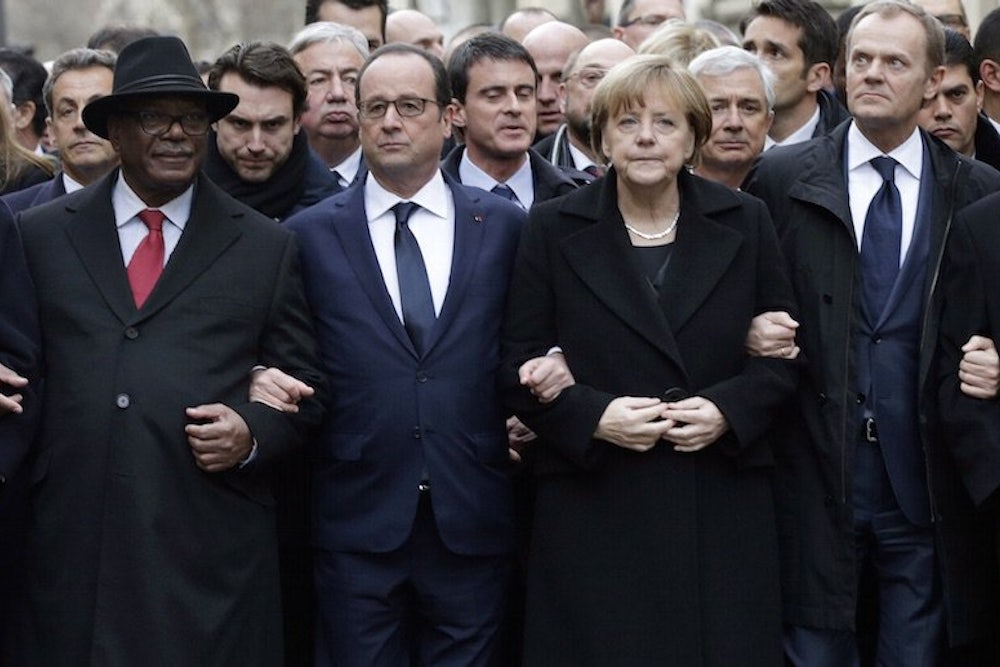This past Saturday, following the attack on a kosher supermarket in connection with the attack on the editorial offices of Charlie Hebdo, the Grande Synagogue of Paris was forced to close its doors on the Sabbath for the first time since the Nazi occupation. After a harrowing increase in anti-Semitic attacks in France this past year, many are wondering—understandably—about the fate of the French-Jewish community, still Europe’s largest and once, arguably, its most vital. Does that community, the question goes, even have a future?
Last night, however, both Benjamin Netanyahu and François Hollande were in attendance at a special rally at the Grande Synagogue. The presence of these two men was a powerful sign that ethnic and religious multiculturalism is alive—if not well—in France. Hollande even wore a kippah—a powerful statement of solidarity in a country that has often clung dogmatically to the doctrine of laïcité, which renders it illegal to differentiate individual citizens on the grounds of their religion and has led, among other things, to the government’s 2004 decision to ban outward signs of religious affiliation such as headscarves and, yes, kippot from public schools.
Although Netanyahu, in his remarks, carefully suggested that the State of Israel would welcome any and all who wished to make aliyah in the wake of recent attacks, it was more likely Hollande whose visit to this most symbolic of sites will tell us more about the future of the Jews in France.
Gracefully poised above the rue de la Victoire, Paris’s Grande Synagogue—the largest in France—is as much a metaphor as it is a sacred space, the projection into marble and stone of a community and its mores. Completed in 1874, the synagogue is the seat of the Chief Rabbi of France and, in many ways, a pillar of the French-Jewish establishment. Unique among its European counterparts, that establishment has always been a testament to the French Revolutionary ideals of liberty, equality, and fraternity, as well as a barometer for the durability of the Republic ostensibly devoted to those noble and high-minded values.
The synagogue, majestic and beautiful, evinces the great nineteenth-century aspirations of French Jewry, far more liberated than the majority of Jewish communities in Europe at the time. Challenged but ultimately vindicated in the course of the Dreyfus Affair, the congregation of the Grande Synagogue emphatically showed its critics that it was more than possible to be both proudly Jewish and proudly French—most importantly, that the particularism of the former does not contradict the universalism of the latter. It is a line that still survives today: Look no further than the fact that it was La Marseillaise that those gathered last night sang after Netanyahu finished, not Hatikvah.
Hollande’s presence was, of course, part of his presidential duty. But it was also, at least in recent memory, perhaps the greatest act of respect that a sitting president has shown to the idea that there exist—even in secular, universalist France—particular communities with particular memories, experiences, and identities. Moreover, Hollande was quick to designate the attack on the kosher supermarket an anti-Semitic attack, a distinction that may seem obvious to Anglo-American observers but that, in a French context, is not always readily made. For instance, in the brutal 2006 murder of Ilan Halimi, a 23-year-old Jewish cellphone salesman, by the so-called gang des barbares, the police initially refused to identify the crime as anti-Semitic. The humility of Hollande’s appearance yesterday, on the other hand, was a kind of acknowledgment that the grief of a particular community need not always be subsumed into a larger, universalized narrative.
In fact, Hollande’s actions show not only respect for the victims of the attacks but also a much-needed affirmation for the communitarian reality that does, can, and should exist not in opposition to but alongside laïcité. That may not be enough to ensure a vital Jewish future in France, but it is certainly a place to start.
By contrast, the aftermath of Charlie Hebdo has revealed that there is hardly any such respect for France’s Muslim community, also the largest of its kind in Europe and confined to the periphery of France’s cities and public life. Now, more than ever, is the time that this community should be recognized and legitimized, alongside the affirmation that French citizens need not efface their ethnic or religious identities completely in order to be “French.” As Olivier Roy argued in Le Monde this weekend, France cannot deny Muslims the right to communally engage and expect them to condemn terrorism as a community. Welcoming French Muslims into the social mainstream is an absolute necessity as France grapples with the aftermath of these tragedies.
In these uncertain days, the words of the French historian Pierre Birnbaum seem especially relevant. As Birnbaum concluded in the final pages of La France imaginée (1998), only in a France “released from the tyranny of utopian myths, determined to show respect for the cultural memories of all its citizens” can each of them be encouraged “to work on behalf of the public good.” Perhaps, then, the President’s next visit should be to Paris’s Grande Mosquée.
